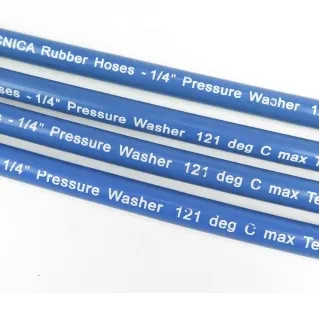335345435
Aug . 07, 2025 10:46 Back to list
High Pressure Washer Hoses: Buying Guide, Specs, and Supplier Insights
Whether you’re blasting grime off construction equipment, cleaning factory floors, or detailing vehicles, your pressure washer is only as good as its hose. A leaking, stiff, or poorly matched hose won’t just slow you down—it can become a safety hazard. That’s why choosing the right high pressure washer hose matters.
If you’re currently searching for a high pressure hose for sale, or trying to compare pressure washer hose suppliers, this guide will help you understand the types, specs, price ranges, and what to look for when buying.

What Is a High Pressure Washer Hose?
A high pressure washer hose is designed to carry water at pressures ranging from 1,500 PSI (pounds per square inch) to over 10,000 PSI in some industrial settings. It connects the pressure washer pump to the spray gun and must withstand high internal pressure, external abrasion, and frequent movement.
Unlike standard garden hoses, pressure washer hoses are built with:
Reinforced synthetic rubber or thermoplastic layers
Steel or textile braiding
Abrasion- and kink-resistant outer covers
Brass or stainless steel fittings
Some high-end hoses also include:
Quick-connect couplers
Hot water resistance (up to 155°C or 311°F)
Non-marking jackets for indoor use
Types of High Pressure Washer Hoses
There are several hose types to consider based on pressure range, water temperature, and use case:
1. Consumer-Grade Hoses (1,500–3,000 PSI)
Used with electric pressure washers
Light-duty, flexible thermoplastic or PVC
Inexpensive but wear out faster
2. Professional-Grade Hoses (3,000–6,000 PSI)
Rubber or polyurethane build
Dual or triple-layer reinforcement
Heat- and kink-resistant
Suitable for daily or commercial use
3. Industrial High Pressure Hoses (6,000+ PSI)
Designed for ultra-high pressure systems (hydroblasting, jetting)
Reinforced with steel wire braid or spiral wrap
Available with chemical- or oil-resistant linings
Key Specs to Consider
When shopping for a high pressure hose for sale, pay close attention to:
|
Specification |
What to Look For |
|
PSI Rating |
Match or exceed your washer’s output (e.g., 4000 PSI) |
|
Diameter |
Common: 1/4", 3/8", 1/2" – affects flow rate and flexibility |
|
Length |
25 ft, 50 ft, 100 ft standard – longer = more reach but more resistance |
|
Temperature Rating |
Needed for hot water units (>60°C / 140°F) |
|
Fittings |
Quick-connect, threaded, or custom – check machine compatibility |
|
Jacket Material |
Non-marking for indoor use; high-abrasion for construction use |
High Pressure Hose for Sale: Where to Buy
You’ll find high pressure washer hoses for sale through various sources:
1. Local Equipment Dealers & Tool Shops
Ideal for urgent replacements
Staff may help match your machine’s specs
2. Online Industrial Suppliers
Huge range of brands, specs, and prices
Make sure to filter by PSI, fittings, and temperature rating
3. OEM Hose Manufacturers
Great option for B2B or bulk buyers
Custom hose lengths, fittings, branding, or reinforcement
Volume pricing and long-term supply contracts available
Pressure Washer Hose Suppliers: What to Look For
Choosing the right pressure washer hose suppliers can affect your hose’s durability, availability, and after-sale support. Here’s what to consider:
Certifications: ISO, CE, SAE standards for industrial applications
Material Quality: Steel-braided vs. textile, single- vs. double-reinforced
Customization Options: Length, connectors, branding, packaging
Shipping and Logistics: Can they deliver quickly and handle bulk freight?
Warranty & Service: Especially for professional and commercial buyers
Top brands and suppliers include:
Parker Hannifin
Gates Corporation
Goodyear / Continental
Kuriyama
Flexzilla
OEMs from China, India, Germany, and the U.S.
High Pressure Hose Price Overview
The high pressure hose price depends on build quality, pressure rating, length, and supplier. Here's a general breakdown (USD):
|
Hose Type |
Price Range (USD) |
|
25 ft, 1/4", 3,000 PSI |
$25 – $40 |
|
50 ft, 3/8", 4,000 PSI |
$45 – $80 |
|
100 ft, 3/8", 4,000–5,000 PSI |
$90 – $150+ |
|
50 ft hot water hose (350°F) |
$80 – $140 |
|
50 ft ultra-high pressure (>6,000 PSI) |
$150 – $300+ |
Bulk or OEM pricing for resellers and equipment manufacturers can be negotiated 20–40% lower, especially in 500 ft or 1000 ft coil formats.
High Pressure Washer Hose FAQs
Q1: What size pressure washer hose do I need?
A: Most commercial units use 3/8" hose. For light-duty machines, 1/4" may be fine. Match the size to your washer’s flow rate and connection ports.
Q2: Can I use any pressure washer hose with my machine?
A: No. The hose must match the PSI rating and connector type of your pressure washer. Always check the fittings and max pressure.
Q3: What’s the difference between steel-braided and non-braided hoses?
A: Steel-braided hoses handle higher pressure, are more durable, and resist expansion. Non-braided hoses are more flexible but less rugged.
Q4: Are hot water pressure washer hoses different?
A: Yes. They’re rated for higher temperatures (up to 311°F / 155°C) and use specialized inner linings that don’t degrade with heat.
Q5: Where can I buy custom-length high pressure hoses?
A: Contact OEM hose suppliers or industrial hose manufacturers. Many offer made-to-order hose assemblies with custom fittings and branding.
-
LPG Hose: Choosing the Right Hose for Safe, Reliable Gas Transfer
NewsAug.07,2025
-
Industrial Hose: Types, Applications, and Where to Find Reliable Suppliers
NewsAug.07,2025
-
Hydraulic Hose Pipe: Types, Pricing, and How to Source the Right One
NewsAug.07,2025
-
Hydraulic Fittings: Types, Customization, and Where to Source Them
NewsAug.07,2025
-
High Pressure Washer Hoses: Buying Guide, Specs, and Supplier Insights
NewsAug.07,2025
-
Choosing the Right Gasoline Hose: Flexibility, Resistance, and Supply Options
NewsAug.07,2025



